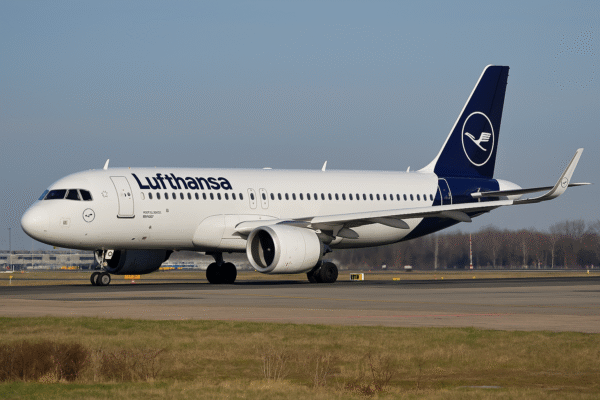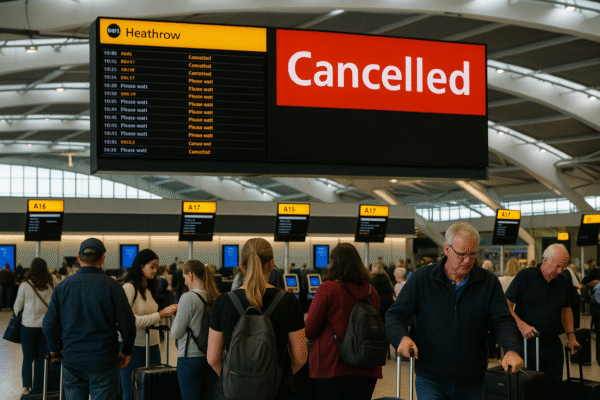A large-scale cyberattack has struck some of Europe’s busiest aviation hubs, causing significant travel disruption for thousands of passengers. London Heathrow, Brussels, and Berlin Brandenburg airports have all been severely impacted, with airlines scrambling to manage canceled flights, long delays, and frustrated travelers.
The attack targeted the MUSE (Multi-User System Environment) software developed by Collins Aerospace, a system essential for check-in and boarding operations. Beginning late on Friday night, the disruption quickly spread across airlines dependent on this platform, forcing them to switch to manual systems. The result: chaotic terminals, extended queues, and mounting passenger dissatisfaction.
The Root of the Problem
Collins Aerospace confirmed that the attack directly affected check-in and baggage processing systems. Without access to digital operations, airlines had no choice but to revert to manual boarding passes and baggage tags—slowing the process to a crawl. While safety and air traffic control remained unaffected, the operational paralysis was enough to cause widespread cancellations and ripple effects across Europe.
Impact on Heathrow Airport
As Europe’s busiest international hub, London Heathrow Airport experienced some of the most visible disruption. Over the weekend, more than a dozen flights were delayed and nine were canceled, with British Airways, Lufthansa, United Airlines, and Aer Lingus among those hit hardest.
- Delays reported: 14
- Cancellations: 9
- Airlines most affected: British Airways (multiple delays and cancellations), Brussels Airlines, and Lufthansa.
Despite the chaos, Heathrow Terminal 5, used exclusively by British Airways, largely escaped the disruption thanks to its independent systems. Still, passengers traveling through other terminals faced hours of waiting, with airport officials urging long-haul passengers to arrive at least three hours early.
Brussels Airport: The Hardest Hit
Among the three airports, Brussels Airport endured the greatest number of cancellations. More than 30 flights were grounded, with airlines such as Brussels Airlines, Vueling, SAS, and easyJet significantly impacted.
- Delays reported: 12
- Cancellations: 34
- Severely affected carriers: Brussels Airlines (13 canceled flights), Vueling (7 canceled flights), and SAS (3 canceled flights).
Passengers bound for major European destinations including London, Barcelona, and Munich were left stranded. Staff worked tirelessly to accommodate travelers and issue manual boarding passes, but wait times stretched for hours.
Berlin Brandenburg Airport: Delays Dominate
At Berlin Brandenburg Airport, delays far outweighed outright cancellations, but the disruption was no less severe for passengers. EasyJet bore the brunt of the chaos, with more than 20 delayed departures in a single day.
- Delays reported: 27
- Cancellations: 4
- Notable impacts: British Airways canceled three flights to London, while Lufthansa and other European carriers also reported setbacks.
Travelers heading to popular destinations such as Palma de Mallorca, Copenhagen, and Vienna faced frustrating uncertainty as schedules shifted repeatedly.
Wider European Impact
While Heathrow, Brussels, and Berlin were the epicenters, smaller disruptions rippled across other airports, including Dublin and Cork in Ireland. Fortunately, major hubs such as Paris Charles de Gaulle, Frankfurt, and Amsterdam Schiphol continued operations without incident, offering some relief to travelers seeking alternate connections.
Recovery Efforts Underway
By Sunday evening, Collins Aerospace had announced ongoing recovery efforts, with teams working to restore automated systems as quickly as possible. Airports continue to rely on manual processes, but industry officials stressed that safety remains uncompromised.
The European Commission also confirmed that it is monitoring the situation closely. While the cyberattack disrupted passenger services, air traffic management and flight safety systems were not impacted. Experts in aviation and cybersecurity are now working together to strengthen resilience against future threats.
Advice for Travelers
Passengers planning to travel in the coming days are advised to:
- Check flight status regularly before leaving for the airport.
- Arrive early—at least three hours before long-haul flights and two hours before short-haul.
- Pack essentials in carry-on bags, as baggage handling may face additional delays.
- Stay flexible, as cancellations and rebookings remain likely during the recovery period.
Lessons for the Aviation Industry
This cyberattack has raised pressing concerns about the aviation industry’s reliance on automated systems. With technology at the heart of modern travel operations, experts emphasize the urgent need for stronger cybersecurity measures.
Airlines and airports across Europe are now expected to review their digital infrastructure, implement stricter protocols, and build contingency systems to ensure smoother operations should similar events occur in the future.
Looking Ahead
As recovery continues, travelers should brace for ongoing inconvenience, but the incident also highlights a broader industry challenge: balancing efficiency with resilience. The aviation sector will likely use this crisis as a turning point to prioritize cybersecurity alongside passenger safety.
For now, patience and preparation remain the traveler’s best allies, as airports and airlines work tirelessly to return Europe’s skies to normal.
For more travel news like this, keep reading Global Travel Wire


















